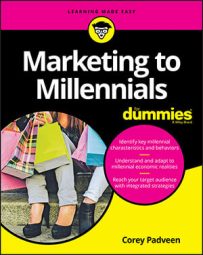Millennials are poised to receive the greatest transfer of wealth in economic history. Estimates from major American financial institutions, like Morgan Stanley, and research firms suggest that over the next several decades, Millennials will receive somewhere near $30 trillion from the generations that preceded them. That is a startling figure, and one that undoubtedly whets the appetite of marketers in any field.
To determine where that money is likely going to go, marketers should become aware of the spending habits of Millennials. This knowledge will help them build effectively targeted campaigns.Goldman Sachs has provided key information about Millennials’ traits.
Some of the factors that affect their behavior are as follows:
- Money is coming in, but it isn’t necessarily going out. Mean income for young Millennials has gone down over the last decade. Millennials are working, but the cost of living has significantly increased. Income indicators like average national minimum wage have gone down. So, while Millennials are currently a significant portion of the national population, their disposable income isn’t significant. This may have a big impact on buying behaviors, even after the transfer of wealth.
- Millennials carry a huge amount of debt. The cost of education is a big one for Millennials and has a major impact on what they are willing to spend. In the last decade, according to the Federal Reserve, mean student loan balance has more than doubled for young Millennials. This counts as a form of long-term debt. (That is, debt that is not set to be repaid over the next five years.) This has a significant impact on Millennials’ decision-making processes. Because of this debt, buying decisions are methodical and based largely on utility. A significant part of that utility is rooted in the extraneous benefits of a purchase.
For example, on top of the usefulness of a product or service, is there more to be gained from the brand or ownership in the long-run? This is one of the reasons why creating relationships with Millennials and establishing yourself as a trusted brand are so important to both acquiring new customers from this market and keeping them committed over the course of their consumption lifetime.
- Ownership is not a priority. Major, long-term financial commitments are not as important to Millennials as they were to previous generations. In a world where the share economy and on-demand services have exploded, ownership is less important than access. The sharing economy plays a major role in the Millennial consumer cycle.
The sharing economy is the market for shared goods and services, giving participants in the economy access over ownership. Millennials have gone through the stages of consumer maturation during a recession era, which has led to significant financial conservatism. Companies or products that fall into the share economy, such as Uber or Airbnb, allow Millennials to access the goods and services they need, when they need them, without requiring them to pay the price of ownership.
- Millennials are willing to play the waiting game. Just because ownership is not as important to Millennials doesn’t mean that it isn’t on their radar screen. Millennials are more patient and willing to wait for the right time to buy. This, once again, is because of the accessibility granted by both the sharing economy and on-demand services. Almost everything is accessible at the touch of a virtual button, so the necessity to own isn’t quite what it used to be.
- Brand loyalty goes deep. Previously, when making a sale, recognition and a strong brand were all that mattered. Now, it’s the relationship between the Millennial and the brand. Also, referrals matter more than ever. Millennials care what their friends and family say. Customers trust referrals more than traditional advertising.
- Quality matters more than price. Millennials are a particularly price-sensitive bunch primarily because they became consumers during the Great Recession of 2008. Price sensitivity combined with a heavy education debt load means that they are cautious spenders. When they do decide to make a purchase, the focus is much less on price than it is on quality. Millennials want a product that lasts as well as a long-term relationship with the brand in question.

